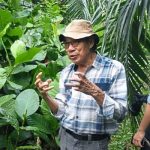
Do you wonder if there are similarities between plants and human beings? To the naked eye, there may not be any. Plants seem static, void of feelings and can’t speak. Science, however, tells us otherwise – plants move towards their source of food (the sun) and are also susceptible to diseases, just like humans.
Having a scientific understanding, however, is not enough. You need to get out and explore these similarities to find a connection between you and nature.
This was what the now 72-year-old Vincent Chow did.
Growing up in Kluang on a 2-acre vegetable farm and a river flowing in his backyard, young Vincent loved nature so much, that he was busy swimming in the river even on the day of his exam. His admiration for nature went beyond the river. His father, who was a game warden, would leave Vincent in the jungle, pitch dark, while the adults went hunting for poachers.
In that darkness, Vincent became curious. He let animals come up and sniff him as he lay quiet and still. He then realised that nights and days are different in the wild. Once he grew older, he started formally documenting the jungle’s species with a team. They capture pictures and observe animals in their natural habitat. Taking pictures of animals requires a relationship with them, and his love for nature make the animals feel secure around him – they do not run when ‘shot’. He has since published six books on the biodiversity of Johor through collaborations with the Department of Forestry, Johor National Parks and private sectors.
Malaysia has one of the most diverse tropical rainforests in the world and Johor is integral to the massive tropical beauty we have. Conservation International described Malaysia as one of the 17 countries to be “mega diverse”. To Vincent, it is a shame Johor has not been promoted as an ecotourist destination – environmental education opportunity lost to the mushrooming of shopping malls and other materialistic entertainment. His books give attention to nature that has been ignored – ones we have, ones that are gone forever, and the ones that might be gone soon.
“The world is so exciting! Why should I retire? The word retire shouldn’t even exist!” says Vincent. The phrase environmental enthusiast does not do justice to his love for the environment: he is a through-and-through supporter, protector, fan, friend, and lover of nature.
Vincent believes that using simple words and short descriptions is the key to attracting children and the general population to understand nature. Jargon and big words, though sophisticated, are not well-received if the aim is truly to educate and create awareness. Education and cultivating a love for the environment in children is key to saving what we have, and it is not too late to start from kindergarten or primary school. During his time in school, he was taught by British teachers who were passionate about ecology. Vincent believes that passionate, smart and exemplary teachers who go beyond the textbooks can entice students to feel a sense of responsibility for the environment.
“If you don’t understand your own nature, how do you interact with other people?”


